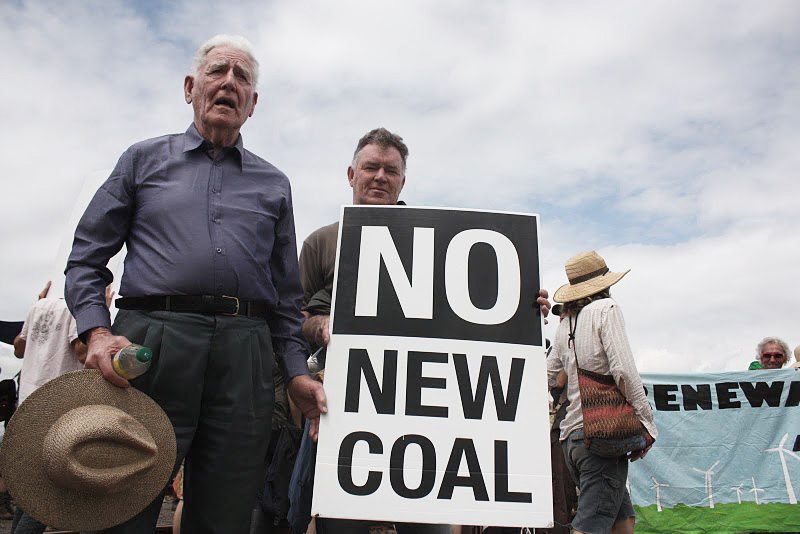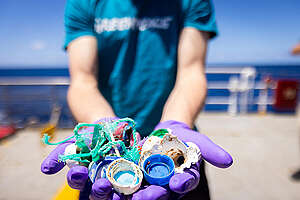88-year old war veteran, Bill Ryan, and his son, Colin, 62, are committed climate activists. Although they’d prefer a peaceful retirement at home in Sutherland, they say the call for change is too strong.

Between their busy schedule of community meetings and court preparations for taking direct action, we found a quiet moment for tea and a chat.
I have to start with the obvious, Bill – Why would a man your age be willing to get arrested to help stop climate change?
Bill: Well, I’m a pensioner, and I think back on my life and all things people my age have enjoyed, and I realize that young people today, like my grandkids, won’t be able to enjoy those things anymore. But why is that? Shouldn’t we be passing on a better world to the next generation? I didn’t fight in a war, and spend my life as a unionist to make the world worse.
So what was your entry point – how did you first get involved?
Col: We started out by going along to the SCAN (Sutherland Climate Action Network) meetings. And then we get more interested from there. We often hand out flyers and chat to people at the train station. We’ve joined Greenpeace protests out the front of ANZ branches over their coal investments. On the 31st of January we faced court with 68 others for blocking a coal train.
So how many times have you been arrested?
Bill: Four.
Wow, what for?
Bill: The first time was when we joined the Climate Camp march on the Helensburgh coal mine. We also stopped a coal train at Sandgate, Newcastle, and occupied a coal storage facility Newcastle. Then, the last protest we did was a blockade on a coal rail track at Bayswater power station.
Col: Plus the one in Canberra. We blockaded the main entrance to Parliament House to call for a decent carbon price.
Bill: That was pretty scary. We wanted to extend the action so I went all limp as police approached and it took four of them to carry me away. They were very nice about it and I didn’t get hurt, but it still shakes you up. The first time I got arrested, I had a bit of a cry the next day. They made me wait 11 hours in the police station.
Col: It can be quite emotional sometimes. It’s quite distressing seeing your elderly father carried away by police.
Bill: Each time we go along to a rally, I say to Col, ‘Now we’re not going to get arrested this time.’ And then we get there, and we hear the people from climate action groups speak about the problem of coal, and how we’re the ones who can help change people’s minds, and we say, ‘Oh, just this once then.’
You’re always putting yourself on the front line – are people ever rude to you?
Col: Yes, of course, you have some downers. Sometimes you have really good conversations with people on the street and you feel like you’re explaining how we can fix the problem, and then you read articles in the Daily Telegraph that deny that climate change even exists. We can’t compete with the Daily Telegraph. And you do feel alone sometimes. For example, if you get arrested and it’s in the local newspaper, the neighbours don’t understand the reason for your actions. They just see you have broken the law and don’t understand why anyone would do that.
The thing is, we wouldn’t get arrested if we could get the message across any other way. But you just have to keep talking to people.
Before the Helensburgh Climate Camp, we went down to the local IGA each week for six weeks and set up a little table and chairs out the front. Helensburgh has a big coal mine, so we thought we would get run out of town. We started getting nervous when the first person that walked past us said, ‘You’re brave’. But after that lots of people came and had a chat about climate change and how coal affects the community. We told them about the protest that was coming up and why we were doing it. After the camp we held a public meeting as well.
What made you take the step from being ‘concerned’ about climate change to taking direct action?
Col: I read an article and I got utterly depressed for a week. Then I started to read more and I decided to get more involved. I asked Dad if he’d like to come along to the local climate action group and he said….
Bill: …I said, oh all right then, if I have to. I just do whatever he tells me to do. But I was always a unionist.
Tell us more about that.
Bill: I was originally in the army – before I was a Personnel Officer with Telecom. I was in New Guinea during the war. I fought in the Kokoda campaign. I objected to the war afterwards and went joined the anti-Vietnam movement.
Col: He was wounded by Japanese machine gun fire.
Bill: We took part in some demonstrations, and we also got involved in the unions – just rank and file – but I learnt how it works and that you just need to keep talking to people.
Bill, how does the challenge of climate change compare to what you’ve already experienced?
Bill: In wartime, civilians are usually spared, but everyone is going to be affected by climate change. And the floods and the fires and natural disasters that come along with it. So the fight to stop climate change really needs to be on a war footing.
How has it changed your relationship? (Bill and Col look at each other and nod.)
Colin: It’s got stronger.
Bill: We’re retired, so we don’t have careers to think about if we get arrested or get in trouble. But the young people involved in climate action do. That’s what really inspires me.
What would you say to someone who wants to get more involved in climate activism but doesn’t know where to start?
If you’re around Sydney, come along to the People’s Blockade of the World’s Biggest Coal Port in Newcastle. It’s a flotilla run by the local group, Rising Tide. It’s a fun day with kayaks and families. This will be our third. Come and meet us.

